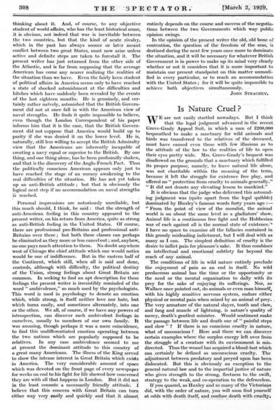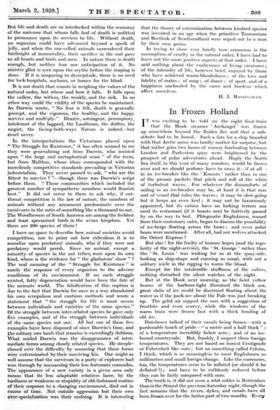Is Nature Cruel ?
WE are not easily startled nowadays. But I think that the legal judgment advanced in the recent Grove-Gnidy Appeal Suit, in which a sum 'of £200,000 bequeathed to make a sanctuary for wild animals and birds was transferred to the relatives of the deceased, must have caused even those with few illusions as to the attitude of the law to the realities of life • to open their eyes pretty wide. Mrs. Grove-Grady's bequest was disallowed on the grounds-that a sanctuary Which fulfilled its proper purpose; namely, to leave natural life 'alone, was not charitable within the meaning of the. term, because it left the struggle for existence free play, and offered no " protection-from cruelty to animals generally." " It did not denote any elevating lesson to mankind."
It is obvious that the judge who delivered this astound- ing judgment was (quite apart from the legal quibble) dominated by Huxley's famous words forty years ago :— " From the point of view of the moralist, the animal world is on about the same leVel as a gladiators' show. Animal life is a continuous free fight and the Hobbesian war of each against all is the normal state of existence." I have no space to examine all the fallacies contained in this grossly misleading indictment, but I will deal with as many as I can. The simplest definition of cruelty is the desire to inflict pain for pleasure's sake. It thus combines an intellectual and emotional subtlety far beyond the any reach of any animal.
The conditions of life in wild nature entirely preclude the enjoyment of pain as an end in itself. No wild predaceous animal has the time or the opportunity or the need or the mental organization to daily with its prey for the sake of enjoying its sufferings. Nor, as- Wallace once pointed out, do animals or even man himself, with his highly sensitive nervous system, endure either physical or mental pain when seized by an animal of prey. . The very armature of the natural slayer, tooth and claw, and fang and muscle of lightning, is nature's quality of mercy, death's gentlest minister. .Would sentiment make the passage between life and death one of "- painful steps and slow " ? If there is no conscious cruelty in nature, what of unconscious ? Here and there we can discover certain examples where the surplus energy left over froin the struggle of a creature with its environment is mis- directed. Thus the weasel has acquired a blood-lust which can certainly be defined as unconscious cruelty. The adjustment between predatory and preyed uppn has been dislocated. But this is obviously an exception to the general natural law and to the impartial justice of nature who gives strength to the strong, fleetness to the swift, strategy to the weak, and co-operation to the defenceless.
If you quarrel, as Huxley and so many of the Victorians did, with the order of nature, you will soon find yourself at odds with death itself, and confuse .death with cruelty,' But life and death are so interlocked within the economy of the universe-.that whoso falls foul of death is unfitted to pronounce upon its services to life. Without death, no organism could have advanced beyond a speck of jelly, and when the one-celled animals surrendered their birthright of immortality, their sacrifice. in the end gave us all beasts and birds and men. In nature there is death enough, but .neither fear nor anticipation of it. No sinister glint is seen upon the scythe before the reaping is done. If it is unsparing to decrepitude, there is no need for lock-hospitals, asylums, or homes for the blind.
It is not death that counts in weighing the values of the natural order, but where and how it falls. It falls upon the callow, the witless, the weakly, and the sick. In no other way could the virility of the species be maintained. As Darwin wrote, " No fear is felt, death is generally prompt, and the vigorous, the healthy, and the happy survive and multiply." Drastic, astringent, peremptory, intolerant of the laggard, the Laodicean, the drifter, the ungirt, the facing-both-ways Nature is indeed—but Cruel never.
In the interpretations the Victorians placed upon ." The Struggle for Existence," it has often seemed to me they were generalizing not from Darwin, who insisted upon " the large and metaphorical sense " of the term, but from Malthus, whose . ideas corresponded with the mercilessly competitive standards prevailing in Victorian )ndustrialism. They never paused to ask, " who are the fittest to survive ? "—though there was Darwin's script before them. " Those communities which included, the greatest number of sympathetic members would flourish best." It did not occur to them to ask why, if cut- throat competition is the law of nature, the numbers of animals without any armament predominate over the carnivores in the ratio of something like a thousand to one. the Woodhewers of South America are among the feeblest and least specialized birds in the avian kingdom. Yet there are 290 species of them !
I have no space to describe how animal societies avoid competition, nor to point • out how ridiculous it is to moralize upon predatory animals, who if they were not predatory would perish: Since' no animal, except a minority of species in the ant tribes, wars upon its own kind, where is the evidence for " the gladiators' show " ? The real meaning of the " Struggle for Existence " is surely the response of every organism to the adverse conditions of its environment. If no such struggle existed, fatty degeneration would have been the fate of the animate world. The falsification of this caption is due to the fact that Darwin for once in a way abandoned his own' scrupulous and cautious methods and wrote a statement that " the struggle for life is most severe between individuals and varieties of the same speciei." Of the struggle between inter-related species he gave only five examples, and of the struggle between individuals of the same species not -one. All but one of these five examples have been disposed of since Darwin's time, and Whatsolitary ewe lamb that remains is exceedingly dubious. What misled Darwin was the disappearance of inter- mediate forms among closely related species. Be steeple- chased over the difficulty by assuming that these forms were exterminated by their surviving kin. One might as well assume that the survivors in a party of explorers had won through by massacring their less fortunate comrades. The appearance • of- a new variety in a given area only Means that its less adaptable relatives have, by the tardiness or weakness or-stupidity of old-fashioned routine of their response to a- changing environment,. died out in course of time. Not outside aggression but their own over-specialization -was their undoing. it is interesting that -the theory of extermination between kindred species was .invented in an age when the . primitive Tasmanians and Boethuk of Newfoundland were wiped out to a man by their own genus.
In trying to show very briefly how erroneous is the assumption of cruelty in the natural order; I have had to leave out the more positive aspects of that order. I have said nothing about the exuberance of living creatures ; of the intensity of life, however brief, enjoyed by those who have achieved warm-bloodedness ; of the love and fidelity of mates ; of song ; of dance ; of sport, and of a happiness unclouded by the cares and burdens which affect ourselves.
II. MASSINCHAISI.

























































 Previous page
Previous page